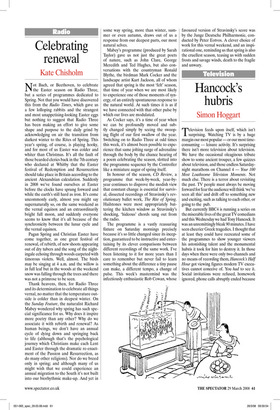Celebrating renewal
Kate Chisholm
Not Bach, or Beethoven, to celebrate the Easter season on Radio Three, but a series of programmes dedicated to Spring. Not that you would have discovered this from the Radio Times, which gave us a few lolloping rabbits and the strangest and most unappetising-looking Easter eggs but nothing to suggest that Radio Three has been making an effort to give some shape and purpose to the daily grind by acknowledging on air the transition from darkest winter to the Rites of Spring. This year’s spring, of course, is playing hooky, and for most of us Easter was colder and whiter than Christmas. It’s all the fault of those bearded clerics back in the 7th century who declared at Whitby that the Easter festival of Redemption and Resurrection should take place in Britain according to the ancient Alexandrian calculation. Suddenly in 2008 we’ve found ourselves at Easter before the clocks have sprung forward and while the earth’s still hard as iron. It’s come uncommonly early, almost you might say supernaturally so, on the same weekend as the vernal equinox and an extraordinarily bright full moon, and suddenly everyone seems to know that it’s all because of the synchronicity between the lunar cycle and the vernal equinox.
Pagan Spring and Christian Easter have come together, as one great festival of renewal, of rebirth, of new shoots appearing out of dry tubers and the song of the nightingale echoing through woods carpeted with timorous violets. Well, almost. The birds may be singing at 4 a.m. and the willow is in full leaf but in the woods at the weekend snow was falling through the trees and there was not a primrose to be seen.
Thank heavens, then, for Radio Three and its determination to celebrate all things vernal, no matter that the temperature outside is colder than in deepest winter. On the Sunday Feature, the naturalist Richard Mabey wondered why spring has such special significance for us. Why does it inspire more poetry than any other? Why do we associate it with rebirth and renewal? As human beings, we don’t have an annual cycle of dying down and springing back to life (although that’s the psychological journey which Christians make each Lent and Easter through the dramatic re-enactment of the Passion and Resurrection, as do many other religions). Nor do we breed only in spring; and although many of us might wish that we could experience an annual migration to the South it’s not built into our biorhythmic make-up. And yet in some way spring, more than winter, summer or even autumn, draws out of us a response from our deepest parts, our most natural selves.
Mabey’s programme (produced by Sarah Taylor) gave us not just the great poets of nature, such as John Clare, George Meredith and Ted Hughes, but also conversations with the countryman Ronald Blythe, the birdman Mark Cocker and the landscape artist Kurt Jackson, all of whom agreed that spring is the most ‘felt’ season, that time of year when we are most likely to experience one of those moments of synergy, of an entirely spontaneous response to the natural world. At such times it is as if we have connected with that other pulse by which our lives are modulated.
As Cocker says, it’s a time of year when we can be profoundly moved and subtly changed simply by seeing the swooping flight of our first swallow of the year. Switching on to Radio Three at odd times this week, it’s almost been possible to experience that same jolting surge of adrenaline through the body by the chance hearing of a poem celebrating the season, slotted into the programme sequence by the Controller like a miniature augur of spring itself.
In honour of the season, CD Review, a programme that week-by-week, year-byyear continues to disprove the modish view that constant change is essential for survival, dissected recordings of Stravinsky’s revolutionary ballet work, The Rite of Spring. Hailstones were most appropriately battering the kitchen window as Stravinsky’s shocking, ‘hideous’ chords sang out from the radio.
The programme is a vastly reassuring fixture on Saturday mornings precisely because it’s so little changed since its inception, guaranteed to be instructive and entertaining by its clever comparisons between different recordings of the same work. I’ve been listening to it for more years than I care to remember but never fail to learn something about the difference a tiny pause can make, a different tempo, a change of pulse. This week’s mastermind was the infectiously enthusiastic Rob Cowan, whose favoured version of Stravinsky’s score was by the Junge Deutsche Philharmonie, conducted by Peter Eotvos. A clever choice of work for this vernal weekend, and an inspirational one, reminding us that spring is also the cruellest season, teasing us with sudden frosts and savage winds, death to the fragile and unwary.
















































































 Previous page
Previous page